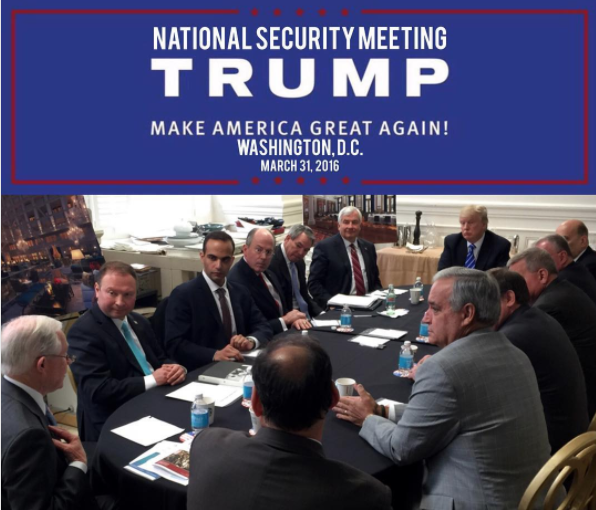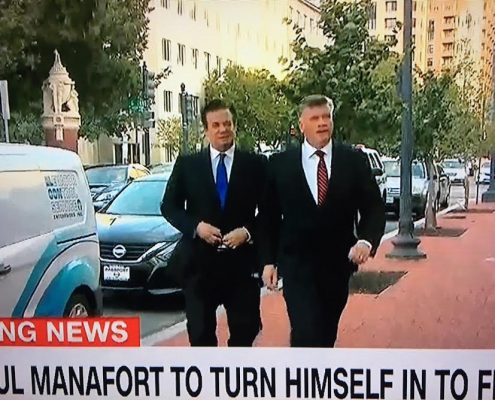What Does the White House Know about Sam Clovis that Chuck Grassley Claims Not To?
In response to Monday’s server hiccups and in anticipation that Mueller is nowhere near done, we expanded our server capacity overnight. If you think you’ll rely on emptywheel reporting on the Mueller probe, please consider a donation to support the site.
The other day I noted that Victoria Toensing’s press comments about her client, Sam Clovis’, appearance before the Mueller grand jury suggested there were discrepancies between his testimony and what George Papadopoulos has been telling the FBI for the last three months.
Nevertheless, after the disclosure that Clovis was the supervisor who told Papadopoulos to pursue a meeting with Russia as late as August 2016, Chuck Grassley still backed his fellow Iowan to serve as US Department of Agriculture’s Undersecretary for Research, Education and Economics. Grassley (who on Monday hid in flags to avoid questions about the Manafort indictment) told Iowa journalists that he had seen the context of the emails and he believed they showed no evidence that Clovis encouraged Papadopoulos to meet with Russian officials.
[I]n a conference call with Iowa reporters Wednesday, Grassley said he has reviewed emails provided by the Trump campaign that include a fuller account of Clovis’ interactions with Papadopoulos. According to those 80-some emails, Grassley said, Clovis does not appear to encourage any travel to meet with Russian officials.
“There’s an entirely different context than what was reported about Clovis and his relationship to this George P.,” Grassley told reporters.
The emails he reviewed cannot be released publicly, Grassley said, although some of them have been referenced in published newspaper accounts and are referred to in the court document from the Papadopoulos case.
When asked if he believes Clovis could face legal consequences over his role in the campaign, Grassley answered that it was “too early for me to say that.”
“But,” he went on, “reading these emails … that’s not an issue.”
Clovis has been scheduled to testify before Senate Agriculture Committee on Nov. 9 as part of his nomination as USDA undersecretary. That could be pushed back, Grassley said on Wednesday. In any case, Grassley said he will introduce Clovis when he comes before the committee.
Mind you, Grassley would have good reason to want an Iowan in a top USDA position, and might even relish the thought of having a non-scientist in charge of science there. So he may be biased.
In any case, the White House may now have a different understanding of matters. CNN reports today that the White House may pull Clovis’ nomination entirely.
A White House source said the nomination of Sam Clovis is in danger and could be pulled soon. A source familiar with the White House’s thinking added that Clovis may have to withdraw, but it is not clear how that will happen, whether he will voluntarily pull out or be forced to do so.
[snip]
A Republican official close to Clovis said he remained loyal to Trump, adding that Clovis would almost certainly not fight the White House in backing away from his USDA nomination if asked.“There’s no way he would fight this or cause trouble for the White House,” a Republican official and longtime associate of Clovis said.
Meanwhile, Clovis’ lawyer Toensing has gotten a whole lot less chatty about her client’s plight.
The White House did not comment Wednesday night, and messages to Clovis’ attorney were not returned.
Admittedly, it may be that the White House simply wants to avoid having to release the 80-some emails Grassley alluded to publicly, as Democrats would surely push to happen. Or it may be that there are details about Clovis’ actions — such as his description of cozying up to Russia as a key priority of the campaign — that the White House wants to avoid any questions about. Or, it may be that the White House simply doesn’t want to give Democrats any chances to focus attention on the substance of Papadopoulos’ plea.
Whatever it is, though, it does seem that Clovis’ immediate future seems to be less bright than Iowan Chuck Grassley claims it is.
Update: The AP reports that Clovis has withdrawn from consideration.





